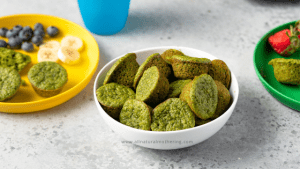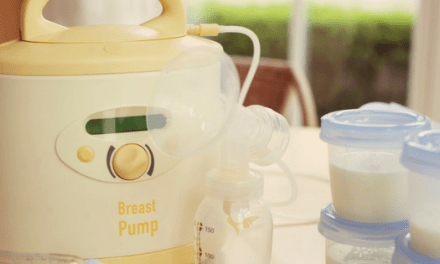I’ll never forget my first bout of morning sickness. The smell of melting butter sent me running to the bathroom. My husband caught the whole thing on camera.
I looked at him like a mom in a sitcom, ready to throw down. But then he gave me that sheepish grin and said, “It makes everything so real.”
Morning sickness is no joke, but it is temporary and a sign that the baby is doing well. Between fifty and eighty percent of pregnant women suffer through it, and it affects each expecting mother differently (source).
Some only get it a little bit in the first trimester. Some struggle with it throughout their pregnancy.
No matter where you fall on this spectrum, if nausea has your stomach in knots, read on for some tips and natural remedies that will help keep morning sickness at bay.
What is morning sickness?
Aside from being the abomination that won’t let you eat pizza anymore, it is nausea and vomiting that is common during pregnancy. It is most common in the morning but can strike any time of day.
It occurs most often during the first twelve to fourteen weeks of pregnancy and usually goes away during the second trimester (source). For fifteen to twenty percent of pregnant women, it may last longer (source).
Severe nausea and vomiting can cause dehydration. Please consult with your doctor if this is the case. Dehydration can cause electrolyte imbalance. If your doctor determines your case is severe, they may prescribe a medication (source).
If left unchecked, severe nausea may lead to hyperemesis gravidarum, which can happen when a woman loses more than five percent of her pregnancy weight (source).
What are the symptoms of morning sickness?
- Nausea during the first trimester
- Feeling sick from certain foods or other smells
- Triggered by spicy foods
- Triggered by heat (source)
What causes morning sickness?
While the underlying cause is not known for sure, it is widely speculated that it may be related to changes in hormones and blood sugar levels. Rising levels of estrogen and progesterone make digestion less efficient.
Here are some other widely speculated causes:
- Stress/ anxiety
- An empty stomach
- Strong odors – hence my issue with melting butter.
- Keen sense of smell – This is stronger when you’re pregnant (source).
- Metallic taste in mouth – Many women experience this during pregnancy.
- Excess saliva
- Sensitive stomach – If you typically get car sick or sea sick, I’ve got bad news. You may be more prone to morning sickness.
- Heartburn/ gastrointestinal reflux (GERD) (source)
When should I talk with my doctor?
Generally, you can wait to consult with your doctor until your next visit. However, if you have any of the following symptoms, you should call:
-
- Flu-like symptoms
- Vomiting blood, which may be red or black
- Dizziness
- Lethargy/ sluggish
- Severe vomiting several times a day or more
- Weight loss (more than two pounds)
- Pelvic pain or cramping
- Inability to keep down fluids for more than a day (source)
Tips to Handle Morning Sickness:
Helpful Habits:
Take care of yourself. When you take care of yourself, you take care of your baby, and you keep morning sickness at bay. Here are some of the lifestyle changes that you can consider making to tackle morning sickness.
- Get out of bed slowly. Sudden movements can make you nauseous and/ or dizzy.
- Avoid caffeine.
- If it makes you nauseous, don’t brush your teeth right after eating . You can even try switching to .
- Get some fresh air. Turn on a fan, and open the windows, especially when cooking, eating, and sleeping .
- Avoid smoke, and ask others not to smoke around you. Remember, you’re doing this for you and your baby.
- Stay hydrated. Try to drink eight glasses of water, milk, ginger ale, or juice slowly throughout the day (source). However, it is best to drink between meals and not with them .
- Rinse your mouth after vomiting with water mixed with a teaspoon of baking soda. This helps with acidity and protects the enamel on your teeth (source).
- If water is giving you trouble, try pedialyte to help with electrolyte imbalance (source).
- Take note of the smells that trigger you, and avoid them.
- Take your prenatal vitamin with some food or before bed . The iron it contains can increase nausea. Talk to your doctor about a slow release option as prenatal vitamins are vital to your health and baby’s. Also, if you decide to take it before bed, avoid snacking with it as lying down after eating can exacerbate nausea as well.
- Get plenty of rest.
Exercise
- Take a walk. Even a twenty minute walk is enough to release endorphins to decrease nausea (source).
- Try meditation or prenatal yoga to help destress (source).
Eating Habits
- Eat a small snack before bed .
- Chew gum for ten minutes after meals.
- Keep snacks stashed everywhere: the office, the car, etc.
- Keep some crackers by your bed. If you get up in the middle of the night, munch on a couple. When you wake up, have a few in bed before you get up .
- Eat small, frequent meals or snacks instead of three big meals . Try to eat something every few hours. Remember, an empty stomach leads to nausea. Aim for six small meals.
- Avoid fried foods .
- Avoid spicy foods .
- Have a snack before bed .
Foods that help with Nausea:
- Ginger (source) – The fresher, the better. I recommend ginger lollipops. They helped me get through labor as well.
- Crackers
- Lean protein (poultry, meat )
- Carbohydrates (rice, toast, potatoes, pasta)
- Almond milk – It helps with heartburn as well.
- Soups, smoothies, and shakes – It may be easier to drink your nutrients and will settle your stomach and blood sugar (source). Try our anti nausea smoothie recipe that contains ginger and berries to help with nausea.
- Water packed fruits and vegetables (melon, watermelon, cantaloupe, etc.)
- Bananas – Potassium may help reduce nausea
- Citrus fruit
- Sour or peppermint hard candies
- Trail mix – Snacking on a good mix with lots of dried fruits and nuts will keep you from getting an empty stomach .
- Dandelion root tea – It helps with liver support, which has to process all the pregnancy hormones .
- Pickles – It’s a pregnancy cliche, but some moms swear by it .
- Grapefruit – It helps to stabilize stomach acid (source). You can also try lemon water or a sugar free lemonade.
- Popsicles or crushed ice – Try watermelon ice cubes or Italian ice for a treat . Here is a pregnancy nausea popsicle recipe made with watermelon; it is a must try if you are suffering from morning sickness.
- Try a bubbly beverage such as ginger ale or Kombucha. It is considered safe for most pregnant women, but you should consult your doctor (source).
Natural Remedies For Morning Sickness:
Please consult with your doctor before trying a natural remedy.
Acupressure wristbands – Lots of women like this option because you don’t have to take any medicine. You can also try some acupressure yourself by placing your thumb 2-3 finger widths down from your wrist. Often we are told not to avoid medications during pregnancy and this sea band is 100% drug free and safe solution to try without having to worry about any side effects.
Some people tend to have better luck with wrist bands while others don’t. But for just under 10 bucks it is definitely worth a try. Personally I can vouch that these bands did make a huge difference for me.
Probiotics: Probitoics have been the talk of the town lately and for a good reason. They are recommended for most of the gut related health issues.
Including a prenatal supplement that contains probiotics will not only help you handle pregnancy challenges like heart burn, bloating and constipation. Not just that, probiotics are also said to improve your baby’s gut health.
I highly recommend try this out if you are having trouble with constipation and heart burn along with nausea. This is truly an all in one product and I would say it is a must have to fight all the terrible first trimester symptoms.
Vitamin B6 – Up to 200mg per day is generally considered safe during pregnancy (source). Some moms swear by combining it with magnesium for a better night’s sleep. If you are not interested in taking multiple supplements, then try this drink mix which contains magnesium , Vitamin B6 and folic acid.
This drink is doctor approved and they even promise a full refund if the drink doesn’t work for you. It comes in a powder form that can be dissolved and consumed with any beverage.
PregEase – It’s a natural, doctor-designed formula. It has vitamins, minerals, and herbal ingredients. Such as Vitamins B6 and B12, calcium carbonate, and ginger. Bonus: It also helps with heartburn (source).
Ginger supplement – While ginger is safe for most pregnant women, you want to proceed with caution if you have low blood pressure, low blood sugar, or are taking blood thinners. These ginger lemon honey drops are great to have it in your purse while you are on the go and the morning sickness strikes. If you’d like something fruity, try these raspberry and ginger candies that is loaded with Vitamin B6 to fight stubborn nausea.
Aromatherapy – Experiment with preferred essential oils. Peppermint and lemon are great choices.
Hypnosis – While there is little research, some women find it helpful (source).
Peppermint or lemon hand lotion – Sniff your hands when nausea strikes at an awkward moment like in the middle of a conversation with your boss.
Papaya enzymes – The pepsin compound inside helps break down your food for ideal digestion (source).
Magnesium supplement – You can also try magnesium oil or increase your intake of magnesium foods such as greens, legumes, nuts and seeds.
Well, I hope these tips were helpful for keeping morning sickness at bay. I know firsthand morning sickness is so powerful it can drop you to your knees, but I promise it’ll end. So hang in there, Mama. And if you come across something that works for you that’s not listed here, please add to the comments below. I’d love to hear from you.

















